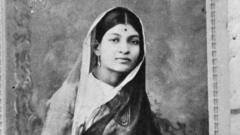On January 12, 1925, the murder of a wealthy businessman and the complexities surrounding it forced significant upheaval within both British India and the princely states.
A Murder That Changed Colonial India: The Bawla Case

A Murder That Changed Colonial India: The Bawla Case
The intriguing murder case of Abdul Kadir Bawla, which led to political turmoil and royal abdication.
In a shocking incident that shook the foundations of British India, the murder of 25-year-old Abdul Kadir Bawla on January 12, 1925, drew attention not just for its brutality but for the intricate web of political and social implications it unravelled. Bawla, a wealthy textile magnate in Bombay, was committed to a dangerous and romantic liaison with Mumtaz Begum, a courtesan escaping the confines of a princely harem. As the couple drove through the affluent Malabar Hill area with friends, they were ambushed by men who sought to abduct Mumtaz, resulting in Bawla being fatally shot.
Described as "perhaps the most sensational crime committed in British India," the murder quickly captivated the public and became a subject of intense media scrutiny. Efforts to investigate revealed links to the Indore princely state, associated with the Maharaja Tukoji Rao Holkar III, who felt slighted by Bawla's relationship with Mumtaz. The case escalated to a point where even the British colonial government was pressured to intervene, caught in a delicate situation due to the state's strategic importance to them.
As investigation unfolded, the British authorities were torn between keeping a lid on the allegations and the mounting evidence implicating the Maharaja’s circle in the murder. The capture of one of the attackers allowed police to link several men to the betrayal surrounding this crime, shedding light on the Maharaja's attempts to reclaim control over Mumtaz. The allegations against the royal family led to a political crisis, forcing the Maharaja to abdicate his throne in exchange for avoiding a public inquiry.
The trial was a spectacle attended by prominent lawyers of the era, including Muhammad Ali Jinnah, who would later become a key figure in Pakistan's founding. Ultimately, the court sentenced several individuals, but fell short of holding the Maharaja responsible, casting a shadow over the legitimacy of justice delivered. Bawla's murder not only resulted in the fall of a powerful king but also led Mumtaz Begum to pursue a new life away from India, marking an end to a chapter in colonial Indian history that explored the interplay of love, betrayal, and power.
Described as "perhaps the most sensational crime committed in British India," the murder quickly captivated the public and became a subject of intense media scrutiny. Efforts to investigate revealed links to the Indore princely state, associated with the Maharaja Tukoji Rao Holkar III, who felt slighted by Bawla's relationship with Mumtaz. The case escalated to a point where even the British colonial government was pressured to intervene, caught in a delicate situation due to the state's strategic importance to them.
As investigation unfolded, the British authorities were torn between keeping a lid on the allegations and the mounting evidence implicating the Maharaja’s circle in the murder. The capture of one of the attackers allowed police to link several men to the betrayal surrounding this crime, shedding light on the Maharaja's attempts to reclaim control over Mumtaz. The allegations against the royal family led to a political crisis, forcing the Maharaja to abdicate his throne in exchange for avoiding a public inquiry.
The trial was a spectacle attended by prominent lawyers of the era, including Muhammad Ali Jinnah, who would later become a key figure in Pakistan's founding. Ultimately, the court sentenced several individuals, but fell short of holding the Maharaja responsible, casting a shadow over the legitimacy of justice delivered. Bawla's murder not only resulted in the fall of a powerful king but also led Mumtaz Begum to pursue a new life away from India, marking an end to a chapter in colonial Indian history that explored the interplay of love, betrayal, and power.




















